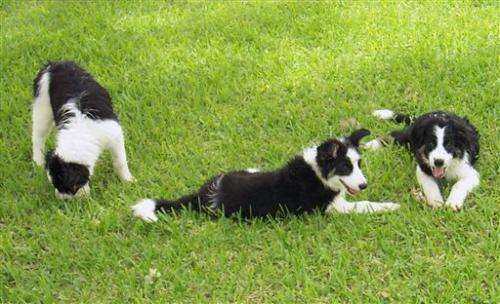Study drops hints that dogs could get jealous

When Shetland sheepdog Maggie comes home from the groomer, her owners praise and pet her shiny coat, much to the chagrin of pit bull Stormy, who will head-butt her until their family cuts out the compliments.
"Stormy's jealous," said owner Amy Putnam. "You know how you're supposed to treat your kids the same? Well, that goes for dogs, too. They get along great and go with the flow until one thinks she is being slighted."
After hearing stories like Putnam's, a psychology professor decided to study for the first time whether the human emotion of jealousy really happens in dogs. The nine-month study published in July in the science journal PLOS ONE hints that it could be possible, but other experts aren't so sure behavior like Stormy's can be called jealousy.
"While I will not say that dogs do not experience jealousy, this article does not prove that they actually do," said Dr. Bonnie Beaver, executive director of the American College of Veterinary Behaviorists and a professor at Texas A&M University's College of Veterinary Medicine.
Beaver also insists dogs lack shame. Despite what people think, the guilty look—head cowered, ears back, eyes droopy—is a reaction to people throwing tantrums over chewed-up shoes and accidents on the carpet, she said.
But Christine Harris, a professor of psychology at the University of California, San Diego, says her dog study supports the theory that there is a more basic form of jealousy.
She and a former student worked with 36 dogs, videotaping owners ignoring their pets while petting and talking sweetly to stuffed, animated dogs or jack-o-lantern pails. A pair of independent workers watched the videos for behavior like aggression or attention-seeking.
When people interacted with the stuffed animals, their dogs pushed or touched them 78 percent of the time; tried to get between the owner and toy 30 percent of the time; and snapped at the fake dog 25 percent of the time, Harris said.
There was much less of that behavior when it came to the toy pails. Forty-two percent of the dogs tried to push or touch them; 15 percent tried to get between them; and 1 percent snapped.
Harris believes the dogs saw the stuffed animals as rivals.
"When they see a loved one show affection toward another what appears to be a real being, they engage in real behaviors to try and draw the affection back to them," Harris said. "That's what you see in humans, too."
Beaver said the study "opens up thoughts about what an animal might be experiencing." But she's concerned about calling it jealousy. A dog might be more interested because another "social being" is interacting with the owner, Beaver said.
Harris said she is not claiming a dog's "internal experience" mirrors that of humans, because it's impossible to know.
"Some say that's not jealous behavior, that dogs don't have emotions like this," she said. "Others have said I am being too cautious, and if they have emotions like us, they will have behavior like us."
Whether dogs get jealous or not, there's certainly much competition for affection in the Putnam house with the arrival of a grandson. Stormy the pit bull wants to be the only dog-sitter for the 6-week-old boy.
"If Maggie gives him any attention, Stormy gets mad and ushers her out," Amy Putnam said, adding she didn't previously think about how the dogs got along.
"But when you talk about it like this, you realize there is a whole lot of jealously going on," she said.
Journal information: PLoS ONE
© 2014 The Associated Press. All rights reserved.

















